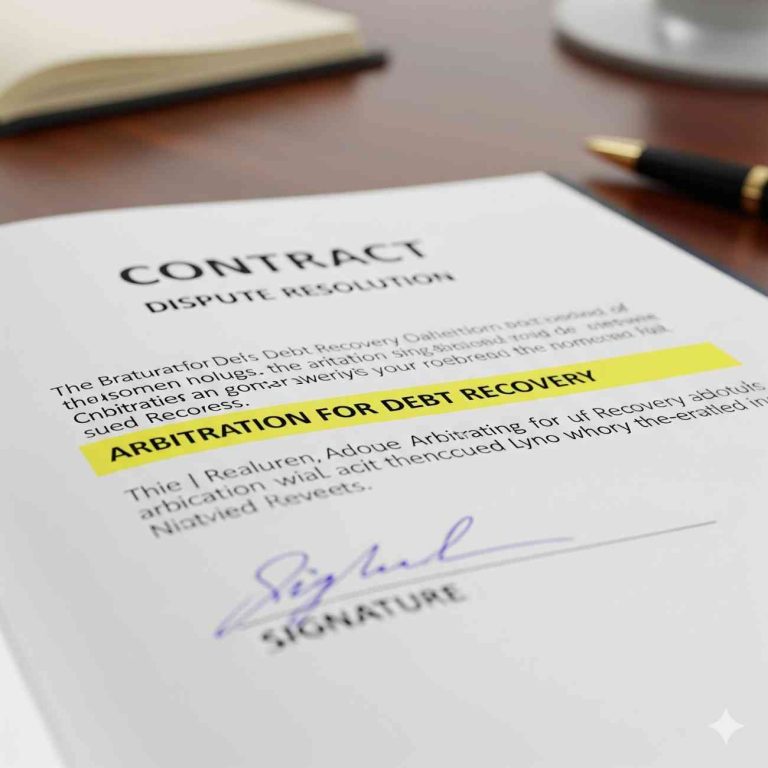Table of Contents
- Arbitration for Debt Recovery: A Comprehensive Guide to Getting Paid
- Why Choose Arbitration Over Traditional Litigation?
- The Arbitration Process in India: A Step-by-Step Breakdown
- Experience in Action: Mini Case Studies
- Common Pitfalls and How to Avoid Them
- FAQs About Arbitration for Debt Recovery
- Quick-Start Checklist for Your Debt Recovery
1. Arbitration for Debt Recovery: A Comprehensive Guide to Getting Paid
Last Updated: September 6, 2025
Arbitration for debt recovery is a private, out-of-court process where a neutral third party (an arbitrator) resolves a payment dispute. The arbitrator’s decision, known as an ‘award,’ is legally binding and enforceable like a court decree. It’s an efficient mechanism for businesses in India to recover unpaid dues from clients or partners, bypassing the lengthy traditional court system, provided there is a valid arbitration clause in your agreement.
In today’s fast-paced business environment, a single unpaid invoice can disrupt your cash flow and hinder growth. When reminders and negotiations fail, waiting years for a resolution through the traditional court system feels like an eternity. This is where arbitration for debt recovery emerges as a powerful, strategic alternative.
But how does it actually work? And is it the right choice for your business? As an advocate who has guided numerous companies through this process, I’ll walk you through the journey from a simple contract clause to the successful enforcement of an award
Why Choose Arbitration Over Traditional Litigation?
While going to court is an option, arbitration offers several distinct advantages for commercial debt recovery:
- Speed: Arbitration is significantly faster. As per a 2023 report by the NITI Aayog, fast-track arbitration can be completed within six months, whereas a similar commercial suit in court can take several years.
- Expertise: You can choose an arbitrator with specific industry knowledge (e.g., tech, manufacturing, construction). This ensures the decision-maker understands the nuances of your business, unlike a judge who may not have specialized experience.
- Confidentiality: Arbitration proceedings are private. This protects your company’s reputation and business relationships from public scrutiny, which is invaluable when dealing with sensitive financial disputes.
- Cost-Effectiveness: While there are upfront costs for the arbitrator’s fees, the faster timeline often results in lower overall legal expenses compared to prolonged court battles.
- Finality: An arbitral award is final and binding, with very limited grounds for appeal. This prevents the losing party from dragging the matter through multiple appellate courts, providing quicker certainty.
| Feature | Court Litigation | Arbitration |
| Speed | Slow, often takes years | Fast, often resolved in months |
| Confidentiality | Public record | Private and confidential |
| Decision-Maker | Judge (generalist) | Arbitrator (often an industry expert) |
| Formality | Highly formal procedures | Flexible and less formal |
| Appeals | Multiple levels of appeal | Very limited grounds for appeal |
The Process of Arbitration for Debt Recovery: A Step-by-Step Guide
Navigating the arbitration process can seem daunting, but it follows a structured path defined by The Arbitration and Conciliation Act, 1996.
Alt Text: A flowchart showing the key stages of arbitration for debt recovery, from invoking the clause to enforcing the award.
Step 1: The Arbitration Clause
Everything begins with your contract. A well-drafted arbitration clause is the gateway to this process. It should specify the seat (location) of arbitration, the language, and the number of arbitrators. Without this clause, you cannot compel the other party to arbitrate.
Step 2: Invoking Arbitration
When a debt is overdue and negotiations have failed, your lawyer will send a formal notice to the defaulting party. This notice “invokes” the arbitration clause, officially starting the process and outlining the claims.
Step 3: Appointing the Arbitrator
The parties mutually agree on a neutral arbitrator. If they cannot agree, the arbitration clause usually outlines a procedure, or an application can be made to the High Court to appoint one.
Step 4: Pleadings and Evidence
You will file a “Statement of Claim” detailing the debt, contractual obligations, and evidence (invoices, contracts, emails). The other party files a “Statement of Defence.” Both sides then submit evidence and witness statements. This is where having experienced payment recovery lawyers in India is critical to building a strong case.
Step 5: The Hearing & The Award
The arbitrator conducts hearings where both sides present their arguments. After considering all evidence, the arbitrator delivers a written decision called an “arbitral award.” This award details who owes what and is legally binding.
Step 6: Enforcement of the Award
If the defaulting party still doesn’t pay, the arbitral award can be enforced through a court of law. You file for execution, and the award is treated like a court decree, allowing for measures like attachment of bank accounts or assets to recover the dues. For more details, explore our guide on comprehensive debt recovery actions.
Experience in Action: Case Studies
Theory is one thing, but results are what matter. Here are two anonymized examples from my practice that highlight the effectiveness of arbitration.
- Case Study 1: The Software Development Dispute
- Scenario: A Chennai-based IT firm developed custom software for a client. The client accepted the final product but then refused to pay the final INR 45 Lakhs, citing minor bugs that were not part of the original scope.
- Action: Their agreement had a strong arbitration clause. We invoked it, and an arbitrator with a background in technology law was appointed.
- Outcome: Within seven months, we secured an award in our client’s favour for the full amount plus interest. The arbitrator’s tech expertise allowed him to quickly see that the client’s objections were baseless attempts to avoid payment. The entire process was confidential, preserving our client’s industry reputation.
- Scenario: A Chennai-based IT firm developed custom software for a client. The client accepted the final product but then refused to pay the final INR 45 Lakhs, citing minor bugs that were not part of the original scope.
- Case Study 2: The Manufacturing Supply Chain Failure
- Scenario: A textile manufacturer in Tamil Nadu supplied goods worth INR 1.2 Crores to a large retail chain. The retailer defaulted on payment, falsely claiming the goods were of substandard quality, despite having accepted and sold a portion of the inventory.
- Action: We initiated arbitration. Our key evidence was the retailer’s own sales records and the lack of any formal quality complaint within the contractually stipulated timeframe.
- Outcome: The arbitrator ruled that by selling the goods, the retailer had implicitly accepted their quality. We recovered not only the principal amount but also costs and damages for the breach of contract. A court case could have taken 3-4 years; we achieved this in just under a year.
- Scenario: A textile manufacturer in Tamil Nadu supplied goods worth INR 1.2 Crores to a large retail chain. The retailer defaulted on payment, falsely claiming the goods were of substandard quality, despite having accepted and sold a portion of the inventory.
These cases underscore a key point: a well-prepared strategy, handled by skilled arbitration lawyers in India, can turn a seemingly dead-end debt into a recovered asset.
Common Pitfalls and How to Avoid Them
- Poorly Drafted Clause: An ambiguous arbitration clause can be challenged, causing delays. Solution: Always have a legal expert draft or review your commercial agreements.
- Ignoring Timelines: The law has strict timelines for responding to notices and filing claims. Solution: Engage a lawyer immediately upon identifying a potential dispute.
- Inadequate Documentation: Failing to keep meticulous records of contracts, invoices, and communications weakens your case. Solution: Maintain a clear and organized paper trail for every transaction.
- Choosing the Wrong Arbitrator: An arbitrator without relevant domain expertise can lead to a poor outcome. Solution: Insist on an arbitrator with proven experience in your industry.
Frequently Asked Questions (FAQs)
If there’s no clause, you cannot force the other party into arbitration. Your primary recourse would be to file a civil suit in court or a complaint under the Insolvency and Bankruptcy Code (IBC), depending on the debt amount.
Costs vary based on the complexity of the case and the arbitrator’s fees (often set by a schedule). While you pay the arbitrator, you save on the protracted costs associated with years of court litigation, making it more economical overall for significant commercial debts.
Yes, an arbitral award is recognized and enforceable throughout India, just like a decree from a civil court.
The grounds for challenging an arbitral award are very narrow under Section 34 of the Arbitration and Conciliation Act, 1996. You cannot appeal it simply because you disagree with the arbitrator’s interpretation of the facts. This ensures finality.
Once the award is passed and the time for challenging it has expired, the enforcement process through a court typically takes a few months, which is still much faster than the entire litigation lifecycle.
Key Takeaways & Quick-Start Checklist
- Arbitration is a powerful tool for efficient and confidential debt recovery in India.
- A strong arbitration clause in your contracts is non-negotiable.
- The process is faster and more flexible than traditional courts.
- Success depends on meticulous documentation and expert legal representation.
Your Debt Recovery Checklist
- Review Your Contracts: Do all your client/vendor agreements have a clear and enforceable arbitration clause?
- Organize Your Evidence: Gather all invoices, purchase orders, delivery challans, and communication records (emails, letters) related to the debt.
- Send a Final Demand Notice: Before invoking arbitration, have your lawyer send a final, formal demand for payment.
- Consult with Specialized Lawyers: Don’t go it alone. Partner with payment recovery lawyers in India who specialize in arbitration.
- Ready to recover what you’re owed? Don’t let unpaid debts cripple your business.
About the Author

Shanmugapriya is an esteemed Advocate of the High Court of Madras, with over a decade of extensive experience in managing complex legal cases, particularly in commercial disputes and debt recovery. Her expertise spans various legal forums, including Commercial Courts, the National Company Law Tribunal, and arbitration panels. Shanmugapriya is recognized for her practical, results-oriented approach and her deep understanding of both Indian and international commercial law, making her a trusted advisor for foreign entities navigating the Indian legal landscape.
Disclaimer
Legal Disclaimer: The information provided in this blog post is for general informational purposes only and should not be construed as legal advice. The legal landscape is subject to change, and the information may not be current or applicable to your specific situation. It is strongly recommended that you consult with a qualified legal professional for advice tailored to your individual needs.

